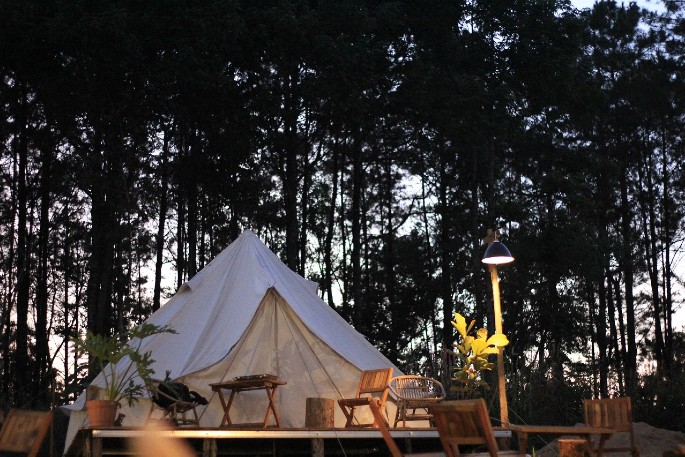This Content Is Only For Subscribers
The boom in glamping and outdoor lodging will take centre stage in Phuket at an upcoming hospitality and sustainability event, where leaders will conduct a masterclass on the subject.
Solar-powered camps, off-grid dwellings and eco-friendly construction materials have become increasingly popular across Asia Pacific, where the outdoor lodging sector is predicted to grow 10.8 per cent annually between 2025 and 2030, according to Grand View Research.
Demand for nature-first tented camps, cabins, yurts, treehouses or nature pods on beaches, mountains, forests and natural areas increased dramatically during and since the Covid pandemic.
The growth today is driven by consumers who want to immerse themselves in nature without compromising (much) on comfort. For nature lovers, the guest experience can often be superior to that of a traditional resort.
Owners, developers, investors and financiers also like outdoor lodging. Start up costs for ‘no walls’ accommodation are generally lower than building a traditionally constructed bricks and mortar hotel or resort. Additionally, the development time is less than half that of a new build, offering greater speed to market. Growth momentum is coming from both the supply and demand side.
Outdoor lodging masterclass
Analysing the glamping trend in the region, the Asia Pacific Outdoor Lodging Association (APOLA) will hold an outdoor lodging masterclass in Phuket on August 31 for existing and potential operators.
At the half-day event, investors, operators and others will learn from experienced practitioners such as John Roberts of Minor Hotels, Allan Michaud of Cardamom Tented Camp, Michael Sagild of Cloud Collective, Tom Butterfield of Eco Structures, and Ueli Wick of Escape Nomade.
Other APOLA experts will share their experiences.
“If you are looking for ideas and insights in finance, sustainability, lodge operations or guest experiences, the outdoor lodging masterclass promises to be a treasure trove of practical insights,” says Paul Dean, Principal of Dean and Associates, who will moderate the session.
Additional expert insights into outdoor lodging will be open to all in session 12 of PHIST 2025, Southeast Asia’s largest sustainable tourism full-day learning event, which takes place September 1, in the same location as the glamping masterclass.
APOLA members addressing the PHIST session will include Koko Tang, co-founder of Vinetree Tourism which has four tented resorts and several sustainable tourism projects in China.
“APOLA’s belief is that outdoor lodging should focus not only on guest experience and quality, but also on sustainability, which should be reflected in every detail from site selection and construction to daily operations. This is the strategic focus of APOLA,” says Koko.
Nature meets well-being
Event speakers will note that Asian glamping trends often have unique characteristics. Grand View Research’s analysis of the region says activities such as yoga, meditation, and spa treatments are increasingly popular as they contribute to personal well-being and mindfulness in a natural setting.
Family-friendly glamping options are also on the rise in Asia with outdoor lodges offering larger accommodations, child and pet-friendly facilities. Other venues specialise in local conservation and community support projects, which guests participate in.
People who register for the APOLA outdoor lodging August 31 masterclass have a chance to win a 3D/2N stay at the multiple award winning Cardamom Tented Camp, a conservation ecolodge in Cambodia. The masterclass cost is THB1,500 (US$46) per person to cover learning materials and refreshments. (Register for the masterclass here.)
Registration for the free PHIST event September 1, which includes the outdoor lodging session, is available here.



